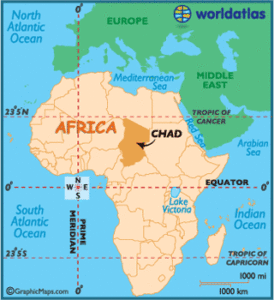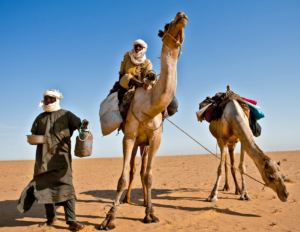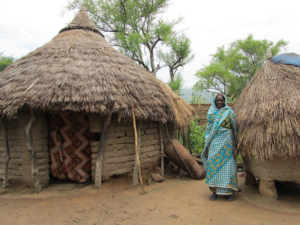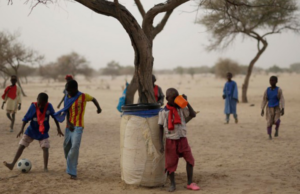Introduction
Chad is one of the poorest and most corrupt countries in the world; most inhabitants live in poverty as subsistence herders and farmers. Since 2003, crude oil has become the country’s primary source of export earnings, superseding the traditional cotton industry. Chad is considered a failed state by the Fund for Peace.
 Unlike other African countries,Chad is seen to offer little to the outside world, with its poor transport infrastructure including 33,400km of roads of which just 267km are paved. Chad also is off putting to visitors because of its high cost of living. Child trafficking for sexual and other exploitation remains a major concern about Chad. Many children are taken for domestic servitude and other forms of labour both in Chad and to other neighboring nations, and there is also evidence of commercial sexual exploitation of children from Cameroon and the Central African Republic being taken into Chad.
Unlike other African countries,Chad is seen to offer little to the outside world, with its poor transport infrastructure including 33,400km of roads of which just 267km are paved. Chad also is off putting to visitors because of its high cost of living. Child trafficking for sexual and other exploitation remains a major concern about Chad. Many children are taken for domestic servitude and other forms of labour both in Chad and to other neighboring nations, and there is also evidence of commercial sexual exploitation of children from Cameroon and the Central African Republic being taken into Chad.
Status of Homosexuality in Chad
Both male and female same-sex sexual activity is illegal in Chad, and individuals and same-sex couples face discrimination and prejudice. The U.S. Department of State‘s 2010 Human Rights Report found that “there were no known lesbian, gay, bisexual, and transgender (LGBT) organizations. There were few reports of violence or discrimination against LGBT persons, in large part because most such persons were discreet about sexual orientation due to social and cultural strictures against homosexuality.”
(1)
De jure and De facto Homosexuality in Chad
In its overview on the situation of LGBTI (lesbian, gay, bisexual, transgendered, and intersex) persons in the African countries, the African Communication Initiative on LGBTI rights and affairs as well as the website Behind the Mask, both provide similar information.
For further information ACCORD-Red Cross contacted David John Frank, Associate Professor at the Sociology School of Social Sciences, University of California, who specializes in questions of legal regulation of sexuality. In his e-mail reply of 26 November 2008 he differentiates between the de jure and the de facto situation of homosexuals in Chad:
“(1) De jure: sodomy is illegal.
(2) De facto:since sodomy is illegal it is punished under the recent law. A few African countries have taken this route, to draw a cultural boundary against the colonial West.
(3) De facto: the national penal code is now relevant in the country, given extreme poverty and longtime internal disorder. Under these circumstances, local political structures might arise (including some fundamentalist Muslim ones) that enforce strict prohibitions against sodomy.” (Frank, 26 November 2008)
(Austrian Red Cross/ACCORD, Wiedner Hauptstr. 32, A- 1041 Vienna
Web: www.ecoi.net, www.roteskreuz.at/accord-en, ZVR No.: 432857691)
(2)
Human Rights and Homosexuality
In its Report “Reproductive Rights are Human Rights“, published in 2003, the Center for Reproductive Rights mentions a regulation of the Penal Code which refers to same-sex couples with one partner younger than 21: “The Penal Code punishes any person who commits an obscene or ‘unnatural’ act with an individual of his or her own sex of any age by imprisonment of three months to two years and a fine of 5,000 (U.S.$7.97) to 100,000 CFA francs. (photo right Djenne Mosque)
(U.S.$159.19).274” (Center for Reproductive Rights, 2003, p. 107)
“The government’s poor human rights record deteriorated further during 2011; security forces committed numerous serious human rights abuses.” Among the abuses listed were extrajudicial killings, beatings, torture, and rape by security forces; limits on freedom of speech and the press and freedom of assembly; arbitrary arrest and detention; and widespread corruption. Security forces commit these and other abuses with “near total” impunity.
Transparency International has ranked Chad as one of the most corrupt nations in the world. In 2007, it scored 1.8 out of 10 on the Corruption Perceptions Index (with 10 being the least corrupt). Only Tonga, Uzbekistan, Haiti, Iraq, Myanmar, and Somalia scored lower.Critics of President Idriss Déby have accused him of cronyism and favoring his own tribe.Deby’s re-election in May 2006 – in which he won a third term – was boycotted by the opposition, who denounced the results as fraudulent.
(from: http://en.wikipedia.org/wiki/Human_rights_in_Chad
The International Labour Organization (ILO) collects legislation concerning social security and related human rights legislation and lists the documents in its database NATLEX. In its Chad section, NATLEX mentions the existence of the penal law of 1996 (ILO, without date). We asked ILO on 3 December 2008 for a copy of same. As soon as we receive an answer we will forward it to you.
(3)
Toward Inclusion and Participation of LGBTI, MSM, WSW and T Organisations in Policy and Decision Making
http://www.osisa.org/Programme/lgbti-special-initiative
LGBTI Special Initiative from Open Society Initiative for Southern Africa
OSISA realises that there is the need to empower the most marginalized people in our communities, such as LGBTI, and contribute to the fostering of inclusive and tolerant societies.
Only two African countries offer some form of protection for sexual minorities: Mozambique and South Africa. The rest have no legislation, repressive or otherwise, regarding sexual minorities, such as Chad, Gabon, Mali, and Madagascar, or impose the death penalty, such as Sudan, Mauritania and parts of Nigeria (the north) or hefty sentences ranging from one month to 10 years’ imprisonment, as in Ethiopia and Botswana, or sentences from 11 years to life imprisonment in Zambia, Malawi, Tanzania, Kenya and Uganda.
 In the OSISA region, the situation differs from country to country. Just looking at ten of the OSISA countries, we find that Malawi and Zambia have repressive legislation that mandates 11 years to life imprisonment for sexual minorities; Zimbabwe has slightly less severe prison terms, ranging from one month to 10 years. Mozambique recently enacted an anti-discrimination employment policy that includes sexual orientation, and further progressive amendments are expected. South Africa has the rights of all people, irrespective of sexual orientation, enshrined in its Constitution, and various other pieces of legislation and policy, making it one of the world’s most progressive countries regarding the rights of sexual minorities.
In the OSISA region, the situation differs from country to country. Just looking at ten of the OSISA countries, we find that Malawi and Zambia have repressive legislation that mandates 11 years to life imprisonment for sexual minorities; Zimbabwe has slightly less severe prison terms, ranging from one month to 10 years. Mozambique recently enacted an anti-discrimination employment policy that includes sexual orientation, and further progressive amendments are expected. South Africa has the rights of all people, irrespective of sexual orientation, enshrined in its Constitution, and various other pieces of legislation and policy, making it one of the world’s most progressive countries regarding the rights of sexual minorities.
In recent years, attention has been drawn to one of many issues faced by LGBTI (Lesbian, Gay, Bisexual, Transgender and Intersex) people – the rising levels of violence, with the root cause of this violence seeming to be gender based. In addition to gender-based violence, gender inequalities in access to resources are still a significant problem on the African continent.
Of all the sexual minority groups, trans people, as gender non-conformists, experence most of this violence on a regular bases. In most African countries, like for gay men and lesbian women, it is illegal for transgender people to live authentically. The strong belief in rigid sex roles and gender stereotypes on the African continent, supposedly rooted in “African” tradition, forces LGBTI people to live in secrecy and isolation.
LGBTI people experience various challenges to their human rights, which include regular humiliation and harassment in public spaces. There is very limited access to medical care and treatment, as medical and mental health professionals lack the knowledge of how to deal with LGBTI. Unemployment and discrimination faced by those “out” LGBTI individuals who are employed, often lead to the LGBTI person haviing to leave his/her employment. We see across our region trans persons taking up sex work to support themselves. This escalates the vulnerability of especially trans women to HIV.
OSISA realises that there is the need to empower the most marginilised in our communities. For this reason, OSISA created the LGBTI Special Initiative that can specifically focus on LGBTI and together with partner organisations, contribute to the fostering of an inclusive and tolerant society in which LGBTI can feel at home and assert their rights in southern Africa.
As such, OSISA supports initiatives that promote advocacy, networking and capacity building in the following areas:
1. Support LGBTI and broader human rights movement building by strengthening transgender and lesbian leadership and building organisational capacity of: National LGBTI, MSM, WSW, T organisations; Regional LGBTI organisations; and Strategic mainstream partners working on LGBTI issues. The capacity of all the partners must be enhanced to enable them to positively contribute to the work done around human rights, health rights, women’s rights, etc. in the communities and countries in which they work.
2. Enhance the strong voice and participation of LGBTI communities in southern Africa in policy and law decision making processes that respond to discrimination and inequalities in the region. One of the outcomes we foresee is the inclusion and meaningful participation of LGBTI, MSM, WSW and T organisations and groups on policy and decision making bodies like Country Coordinating Mechanisms (CCMs). We also anticipate inclusion and meaningful participation of LGBTI, MSM, WSW and T organisations and groups in policy and decision making processes like HIV and AIDS National Strategic Plans.
3. OSISA and partner organisations to advocate for social-cultural change with regards to LGBTI issues in southern Africa through awareness and sensitisation initiatives targeting: Religious leaders and communities of faith; Health care providers and institutions; Academic institutions; Media practitioners and media houses; and, Law and policy makers.
Travel Notice from the UK Foreign Office Regarding Chad
Compiled by Richard Ammon
GlobalGayz.com
















